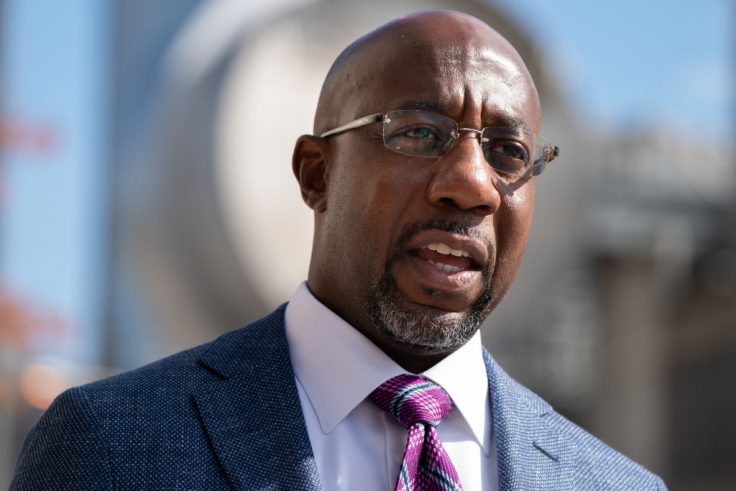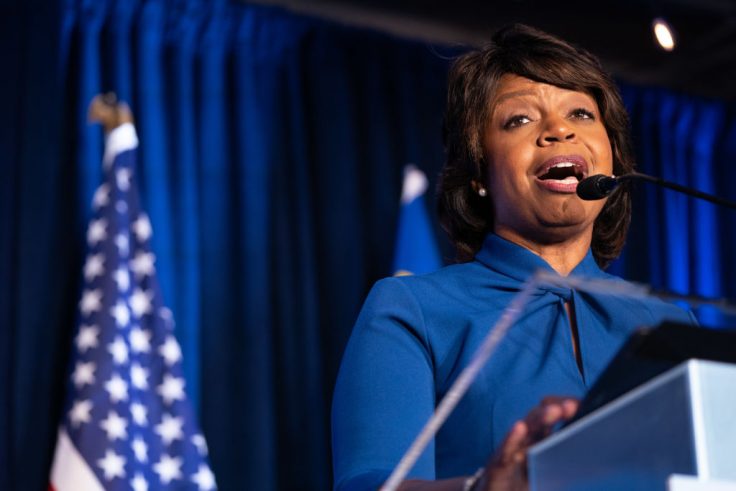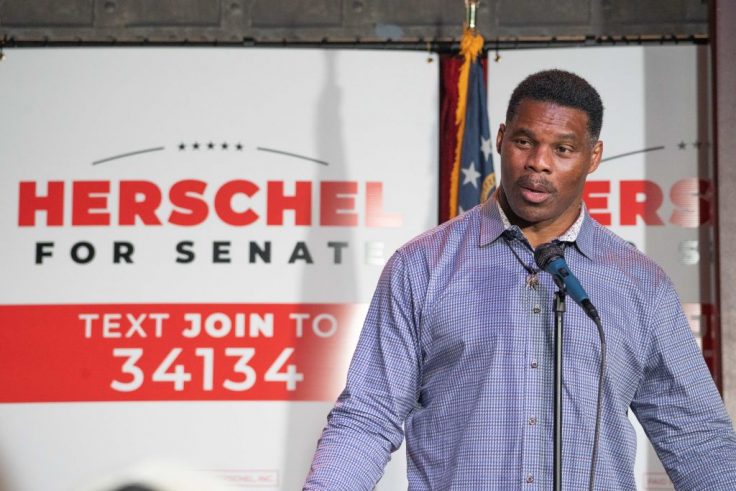WE HAVE TO HAVE A REPUBLICAN MAJORITY IN THE SENATE TO PREVAIL ON THE IMPEACHMENT OF JOE BIDEN FOR SABOTAGE OF HOMELAND SECURITY AND BRIBES SUCKING.
Herschel Walker, the Republican Senate candidate in Georgia, has a 3-point lead against Sen. Raphael Warnock (D.), according to a poll out Thursday—the third survey in a row to find Walker ahead.
Forty-seven percent of likely voters said they are backing the former NFL star, versus 44 percent for Warnock, according to the Fox 5/Insider Advantage poll.
The findings indicate that the momentum has shifted in the highly competitive race since July, when the same poll found Warnock up by 3 points. Walker now leads by half a point in the RealClearPolitics polling average, after spending much of the summer trailing Warnock.
Walker’s campaign said the candidate is "taking absolutely nothing for granted and will keep working hard every day to make sure every Georgian knows he is the right choice."
"Yet another poll shows that no amount of dark money that Raphael Warnock raises from California can buy him this Senate seat," Walker’s spokesman Will Kiley told the Washington Free Beacon.
The Fox 5/Insider Advantage survey, which was conducted earlier this week, has a 4.2 percent margin of error. It is the third poll in a row showing Walker with a small lead in the race.
In late August, a poll by Emerson College found Walker up 2 points, and a Trafalgar Group poll found him up by 1 point.
Republican governor Brian Kemp is also holding an 8-point lead against Democratic challenger Stacey Abrams, according to Fox 5/Insider Advantage. Some Democrats have been quietly expressing concern about Abrams’s difficulty appealing to voters, according to the New York Times.
Published under: Georgia, Herschel Walker, Raphael Warnock, Senate
How Raphael Warnock Dodges Income Taxes
Warnock doesn't pay income taxes on a $90K ‘parsonage allowance’ from Atlanta church

Sen. Raphael Warnock (D., Ga.) has an unusual financial arrangement with an outside employer that allowed him to avoid income taxes on $89,000 in outside salary last year, according to tax experts.
Warnock, who works as the senior pastor at Ebenezer Baptist Church in Atlanta, said the church paid him $89,000 last year as a "parsonage allowance"—as opposed to regular outside income, which is subject to strict limitations for senators under federal law. Lawmakers are not allowed to receive more than $29,895 in outside income.
The news raises questions about whether Warnock is taking a tax break that’s unavailable to the vast majority of Americans. Republicans say Warnock wants to raise taxes, pointing to his vote for a spending package in August that some analysts claim would increase taxes on low- and middle-income earners. The senator has also faced criticism for his outside financial arrangements from his opponent, Republican Herschel Walker. The Walker campaign has slammed Warnock for doubling his annual salary since taking office, raking in $120,000 from the Ebenezer Baptist Church and over $240,000 for a book deal.
Tax experts said the Internal Revenue Service created the modern "parsonage allowance" provision in the 1950s as a tax break for religious leaders, who historically lived in tax-exempt church-owned parsonages but now often rent or own their own homes. The provision allows pastors and other clergy members to deduct their estimated annual housing expenses—including mortgage payments, lawn care, furniture, and pool maintenance—from their income taxes.
Warnock’s campaign declined to comment on whether he paid income taxes on his housing allowance.
Some legal experts also questioned the Senate Ethics Committee’s decision to approve the arrangement, saying it appears to violate federal law that prohibits members of Congress from receiving more than $29,895 in outside income. Warnock’s campaign suggested that the "parsonage allowance" wasn’t subject to the same cap as regular income, according to the Atlanta Journal-Constitution, which first reported on the arrangement last month.
"Sen. Warnock's arrangement appears to be an abuse of both the parsonage allowance provisions of the tax code and Senate ethics rules," Charlie Spies, a Republican campaign finance attorney with Dickinson Wright, told the Washington Free Beacon. "The parsonage exception in Sec. 107(2) is targeted for those who are pastors, not boondoggles for politicians."
Tax experts told the Free Beacon qualified clergy members are allowed to designate up to 100 percent of their salaries as tax-free under the parsonage exemption. Although clergy members need written acknowledgment from their church to participate, religious institutions have no say over the percentage the clergy requests and don’t provide oversight into how the employee spends this money, according to experts. Instead, participating clergy members are supposed to be regulated by the IRS.
While many pastors claim less than 40 percent of their salary as a parsonage allowance, one forensic accountant said he has seen some who take upwards of 70 or 80 percent—an amount he said was "bordering on abusive."
Warnock’s parsonage allowance adds up to nearly 75 percent of his income from the Ebenezer Baptist Church, which breaks down to about $7,400-per-month in housing expenses.
The senator owns a home in Atlanta that was recently appraised at around $1 million, according to property records. In addition to mortgage payments, the parsonage allowance can be used to cover any housing-related costs, including security, landscaping, and home furnishings.
Gil Rothenberg, the former chief of the Department of Justice tax division’s appellate section, told the Free Beacon the parsonage allowance was intended to "even the scales" between wealthy churches and poorer ones, which can’t always afford to provide a well-maintained home for their ministers.
But he said there have also been past cases where religious leaders have abused the system. In 2002, Rothenberg represented the government in a legal dispute with Rick Warren, a megachurch pastor who had claimed $80,000 of his salary as a "parsonage allowance"—an amount that the IRS claimed exceeded the value of his housing. The case prompted Congress to update the law, capping the parsonage allowance at the fair rental value of the home, plus furnishings and maintenance.
"The kinds of cases that got to me when I was at DOJ were basically the really abusive ones," said Rothenberg. "I don’t know how many other ministers are basically padding their parsonage allowance. Nobody knows. You hope that the CPA, or whoever is doing their taxes, is doing it correctly."
While churches note that the provision is crucial for many clergy members, who often don’t earn large salaries, the rule has also been controversial. Critics have accused some clergy members of taking advantage of the exemption, using it to pay for lavish vacation homes and other luxuries.
Peter Reilly, a certified public accountant who has written about parsonage allowances, said Warnock’s allowance "seems like a lot, but it’s not crazy" in comparison with others he has seen.
"Some of the parsonage [allowances] can tend to be enormous," he told the Free Beacon. "Some of the televangelists, it’s millions."
Published under: Georgia, Herschel Walker, Raphael Warnock, Senate
As Judge, Cheri Beasley Wanted Lighter Sentence for Career Criminal Who Possessed ‘Weapon of Mass Death’
Beasley, a former North Carolina Supreme Court justice, argued 'attempted assault with a deadly weapon' is 'not a crime'

Democratic North Carolina Senate nominee Cheri Beasley voted to vacate a career criminal's habitual felon status just after the man was caught with a "weapon of mass death," a move that would have seen him receive a lighter sentence if he committed another crime.
In October 2013, a North Carolina jury found 35-year-old Corey Deon Floyd guilty of possessing a "weapon of mass death and destruction" and possessing a gun as a convicted felon. Those convictions—which came after Floyd was spotted "hanging" around the streets of Kinston, N.C., with a sawed-off shotgun in his pants—led to Floyd being designated with habitual felon status, which prosecutors in the state apply to a person who commits felonies in three separate cases. Under North Carolina law, habitual felons are sentenced to harsher penalties for any subsequent crimes they commit.
If Beasley got her way, however, the career criminal would have lost his habitual felon status. As a state Supreme Court justice in 2016, Beasley voted to vacate Floyd's habitual felon conviction, arguing that one of Floyd's past felonies prosecutors used to justify the designation—attempted assault with a deadly weapon inflicting serious injury—"is not a crime in North Carolina." A majority of Beasley's fellow justices rejected the Democrat's opinion, and as such, Floyd's convictions were upheld. In addition to his attempted assault and illegal gun convictions, Floyd was found guilty of felony cocaine possession on at least two occasions, court documents obtained by the Washington Free Beacon show.
Beasley's vote is at odds with her pledge to "[keep] North Carolina communities safe" in her campaign to replace retiring North Carolina Republican senator Richard Burr. That race has seen Beasley attempt to sidestep GOP criticism on her public safety record as a judge by denouncing the movement to defund police, which caught fire in the summer of 2020 following George Floyd's death. But at that time, Beasley partly defended the Black Lives Matter riots that swept the nation after the event—during a June 2020 press conference, the Democrat said Americans "must recognize the legitimate pain and weight of years of disparate treatment that fuels these demonstrations." Roughly three months later, Beasley said she was "excited about the fact that, since the death of George Floyd and so many others, we have been thinking differently about how we do our work."
Beasley's campaign did not return a request for comment.
Floyd's habitual felon status conviction came after local police received a tip that the criminal was carrying a "sawed-off shotgun in his pants" in public. Officers reached the scene and quickly recognized Floyd, citing their "frequent face-to-face contact" with the felon. Floyd fled when the officers approached, eventually throwing his weapon "into a nearby yard," according to court documents obtained by the Free Beacon.
Prosecutors subsequently sought to label Floyd a habitual felon, using in part his attempted assault conviction—which came in 2005—to justify the charge. Jurors agreed, finding Floyd "guilty of obtaining the status of habitual felon" in 2013.
Floyd appealed the conviction, arguing that "attempted assault is not a recognized criminal offense in North Carolina." Prosecutors, however, did not initially charge Floyd with attempted assault—instead, they charged the felon with robbery with a dangerous weapon and assault with a deadly weapon with intent to kill, charges they only watered down as part of a plea deal. Still, both Beasley and North Carolina's appeals court sided with Floyd through opinions that a majority of state Supreme Court justices rejected in 2016, with Beasley ultimately contending that "attempted assault with a deadly weapon inflicting serious injury is not a cognizable offense in North Carolina."
Beasley, who served on the North Carolina Supreme Court from 2012 to 2020, has already faced criticism from Republicans over controversial opinions she issued during her judicial career. In 2019, Beasley was part of a Democratic majority on the court that sided with a child pornography offender who used a technicality to reduce his sentence.
After a stint on North Carolina's appeals court, Beasley was appointed by former Democratic governor Beverly Perdue to the state Supreme Court in 2012. Voters elected Beasley to a full eight-year term in 2014—five years later, Democratic governor Roy Cooper appointed Beasley chief justice following Republican Mark Martin's retirement from the post. Beasley lost her run for a second eight-year term to Republican justice Paul Newby in 2020 and joined international firm McGuireWoods as a partner in January 2021.
Just months later, in June 2021, Beasley launched her Senate run, which will see her face Republican congressman Ted Budd in November after both candidates won their party's primaries by double digits in May. Beasley has raised $16 million to Budd's $6.5 million.
Published under: Cheri Beasley, North Carolina, Senate

No comments:
Post a Comment